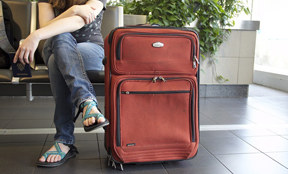
As the flu season sweeps through the United Kingdom and Christmas threatens to make it even worse, many people find themselves grappling with the decision of whether to travel, particularly by air.
The question is, "Can you fly when suffering from flu?" Here travel journalist and expert Pete Barden delves into this controversial topic and explore the factors that should influence your decision.
 Can you fly when suffering from flu?
Here's our guide. (Credit: Pexels)
Can you fly when suffering from flu?
Here's our guide. (Credit: Pexels)
The impact of flying on flu symptoms
Flying, especially in the confined space of an aircraft, can exacerbate flu symptoms. The air in planes is circulated, and the close quarters make it easier for viruses to spread. If you're already battling the flu, the last thing you want is to expose yourself to additional germs, potentially prolonging your recovery.
Transmission risks in air travel
Airports and planes are high-traffic areas, increasing the risk of coming into contact with other individuals carrying various illnesses. The flu is highly contagious, primarily spreading through respiratory droplets. In the close quarters of an airplane, the likelihood of transmission is heightened, posing a risk not only to your fellow passengers but also to yourself.
Safety measures to consider
If you must fly with the flu, certain precautions can help mitigate the risks to yourself and others:
- Wear a mask: Wearing a mask can help prevent the spread of respiratory droplets, protecting both you and those around you.
- Practice good hygiene: Regular handwashing and the use of hand sanitisers can reduce the risk of spreading the flu virus.
- Stay hydrated: Airplane cabins are notorious for low humidity, which can dry out your respiratory tract, making you more susceptible to infections. Staying hydrated can help counteract this effect. Avoid alcoholic drinks and tea and coffee – water will always be best for hydration in a plane cabin.
- Choose off-peak times: Opting for flights during off-peak hours may reduce your exposure to large crowds, minimising the risk of coming into contact with infected individuals. You should especially consider this around the festive period, as there may be few times when passenger numbers drop.
Consideration for fellow passengers
While you may be eager to reach your destination, it's crucial to consider the well-being of your fellow passengers. If you're actively symptomatic, with a fever, cough, or other flu symptoms, it may be best to postpone your travel plans. Not only will this prevent the potential spread of illness, but it also demonstrates a sense of responsibility toward the larger community.
Winter 2024 flu stats
- Stats posted 18-12-2024
| Statistic | Details |
|---|
| Hospital Admissions | 1,861 daily flu-related hospitalisations, a 70% increase from the previous week. |
| Test Positivity Rates | Flu test positivity rates have more than doubled in a week. |
| Flu Cases by Age Group | 1 in 4 adults under 50 currently have the flu. |
| Flu Season Onset | Flu season has started 2-3 weeks earlier than usual. |
| Circulating Viruses | UK facing a "quad-demic" (flu, COVID-19, RSV, and norovirus). |
Subscribe for free motoring and travel news here - support independent journalism
Airline policies for flying with flu
Before heading to the airport with the flu, it's essential to check the policies of the airline you're flying with. Some airlines may have specific guidelines regarding passengers with contagious illnesses. In certain cases, they may allow you to reschedule your flight without penalties to protect the health and well-being of other passengers.
Here is what airline policies says about flying with flu.
British Airways
The official advice from British Airways is that you can fly ‘Once your symptoms have resolved’.
More information from BA here.
easyJet
The website says passengers travelling with a minor infectious disease, including seasonal flu, are permitted to fly when ‘When no longer contagious’.
More information from easyJet here.
Jet2
No specific information on flu, so check with the airline before departure date.
More information from Jet2 here.
Norwegian
Norwegian Airlines says the following about communicable illnesses such as flu: ‘If symptoms of a disease are visible at the time of departure, you must provide a medical certificate which states that your condition is not infectious.’ Speak to the airline or your doctor to provide a fit to fly certificate before departures if symptoms are visible.
Find more information from Norwegian Airlines here.
Ryanair
Ryanair does not specifically mention influenza, but if you have symptoms it would be wise to contact the airline’s customer service team for more information. The airline does not give refunds for those who cancel flights due to flu.
Find out more from Ryanair here.
TUI
The TUI website offers the following information on contagious diseases such as flu: ‘If you or a fellow traveller suffer from a contagious disease (contagious through air or touch) you are obligated to notify the airline company. As long as danger of infection exists, the traveller is not allowed to fly. As soon as the danger of infection has subsided, the traveller is allowed to travel by plane, provided that they present a medical certificate in which a doctor declares that there is no danger of infection through air or touch.’
Find more information from TUI here.
Virgin Atlantic
When it comes to suffering from flu, Virgin Atlantic say that upi can join its flights ‘once your symptoms have resolved’.
Find out more from Virgin Atlantic here.
Wizz Air
When it comes to flying with a contagious disease such as flu, the Wizz Air website says the following: ‘If you have a contagious disease or any other condition requiring medical care, you need a medical certificate confirming your fitness to travel by air.’
Find out more from Wizz Air here.
Conclusion – can I fly with flu?
In conclusion, the decision to fly when suffering from the flu involves careful consideration of various factors. While it is technically possible, the risks of spreading the virus and exacerbating your symptoms should be weighed against the urgency of your travel plans. If you decide to proceed, taking necessary precautions and adhering to airline guidelines can help minimise the impact on your health and the health of those around you. Ultimately, acquainting yourself with airline rules and prioritising the well-being of yourself and others is paramount in navigating this challenging decision during flu season.
Subscribe for free motoring and travel news
Author: Pete Barden:
Twitter: @pete_barden
Pete Barden is a qualified journalist who has written and produced for publications including The Sun (thesun.co.uk), New Statesman Media Group, Whatcar? (Whatcar.com) Stuff Magazine (Stuff.tv), Fastcar Magazine (Fastcar.co.uk), Maxim Magazine and UK broadcast stations within the Heart network (Formerly GCAP). Pete specialises in motoring and travel content, along with news and production roles. You can find out more about Pete Barden on LinkedIn.











